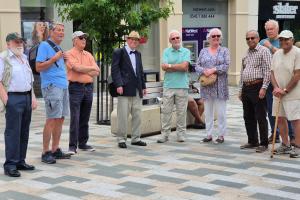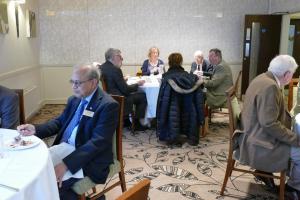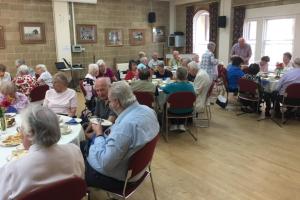Ali Charnock and Louise Thompson: Medical Detection Dogs
Thu, Nov 30th 2023 at 6:30 pm - 9:30 pm
We learn more about them.
This meeting was held at Little Channels.

This was an evening meeting held at Little Channels. We were pleased to welcome some of our members’ relatives and especially former member Mahesh Sodha.
 We had two speakers from Medical Detection Dogs, Ali Charnock, one of their trainers, and Louise Thompson, one of their clients, who brought her Medical Alert Dog, Mercedes. (See picture.)
We had two speakers from Medical Detection Dogs, Ali Charnock, one of their trainers, and Louise Thompson, one of their clients, who brought her Medical Alert Dog, Mercedes. (See picture.)
We heard from another speaker from Medical Detection Dogs, Sarah Scannell, at our lunchtime meeting on 27 July. On this occasion Louise gave the main presentation, which fell into two parts. The first echoed the information Sarah had given us. Then Louise went on to describe her own experiences as a sufferer from PoTS (postural orthostatic tachycardia syndrome), which is caused by problems to the body’s autonomic system. People with the condition experience an increased heart rate when they stand up, possibly leading to dizziness and fainting. Although it is not life-threatening, it can have severe effects on a person’s lifestyle, restricting the activities they can take part in safely.
This was Louise’s experience. She had her driving licence removed, for example. When she came across a reference to Medical Detection Dogs she wondered whether they would be able to help her. She was paired with Mercedes. So Mercedes could be trained to work with her and her condition, whenever she felt an episode coming on she had to use a piece of towelling and then freeze it. She would then give these bits of towel to Medical Detection Dogs so Mercedes could learn to recognise the particular odour Louise emitted when an attack was imminent.
Since Mercedes moved in with her five years ago, Louise has been able to lead a nearly normal life knowing that Mercedes will alert her of an imminent problem so that she can sit or lie down in time. She has even had her driving licence returned.
Ali mentioned that she had known Mercedes since she was a young puppy and wad delighted to see her working so successfully with Louise. Alert dogs can even be paired with children; they are trained to alert not only the child to an attack but also alert the parents or carers so they can take appropriate action.
'What We Do' Main Pages:










